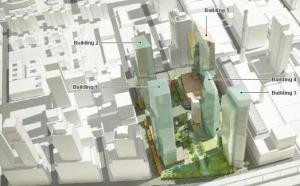Stringer Gives Extell Thumbs Down on Riverside Center
By Eliot Brown September 1, 2010 3:10 pm
reprints Manhattan Borough President Scott Stringer yesterday delivered his official thoughts on the planned Riverside Center housing development on the Upper West Side, recommending against the proposed 2,500-apartment project (with conditions).
Manhattan Borough President Scott Stringer yesterday delivered his official thoughts on the planned Riverside Center housing development on the Upper West Side, recommending against the proposed 2,500-apartment project (with conditions).
The development is the last piece of Riverside South, the giant string of apartment towers along the West Side Highway that were started by Donald Trump in the 1990s (it was once called, affectionately, “Trump City.”) The site has a long and contentious history, and now the developer of the final segment, Extell Development, is proposing to change the zoning to residential (it was intended to be a television studio for NBC), and add more density.
Mr. Stringer, a onetime assemblyman from the Upper West Side, took issue with a number of points, but principally focused on the density (he wants 480,000 square feet less), the open space (he wants it to be more open and inviting), and the schools (he wants Extell to fund a bigger school).
Specifically, on the density issue, Mr. Stringer’s recommendation was critical of Extell for essentially seeking more density than it should be entitled to, given that Extell is leaving 60th Street closed off, getting more development rights as a result (allowable density is based on the size of the site; with a street closed off, the site is significantly larger).
From the recommendation:
[T]he proposed project will result in unmitigatable traffic impacts associated with the project’s density Consequently, this finding cannot be met unless there is a reduction in proposed on-site density. The reduction should reflect an amount that is, at minimum, equivalent to the density gained from not mapping West 60th Street – approximately 480,000 SF.…
It is not sound public policy to encourage development with unmitigated impacts that strain existing infrastructure and reduce the quality of life of all residents in the neighborhood. Consequently, the density increase remains unwarranted.
While this is a common argument to be made by any elected official on any development, the question of density seems particularly relevant at Riverside Center. Extell, as Mr. Stringer points out, is asking for 600,000 square feet, more than a hard-fought mid-1990s agreement with the community and Upper West Side elected officials allows. Extell’s argument is that it is both giving more to the community than envisioned a decade ago (it’s planning to spend tens of millions to help pay for a school), and it would not be economically viable with a smaller project. As for the latter point, perhaps that is true given the amount Extell paid for the site, but no one forced Extell to spend such a high sum.
A spokesman for Extell, George Arzt, said the firm is “disappointed that the recommendations by Borough President Stringer do not adequately recognize these continuing difficult economic times.
“The proposed reduction in density, along with some of the Borough President’s other recommendations, threaten the economic viability of Riverside Center,” he said, adding that Extell would continue a dialogue with Mr. Stringer throughout the process.
The community board also recommended “no” on the project, with conditions that included removing one of the five towers, and it now heads to the City Planning Commission.
The final step is the City Council, which is expected to vote by December.
Late last month, Extell bumped up the amount of below-market rate housing in the project to 20 percent.
Mr. Stringer’s full recommendation is here.



